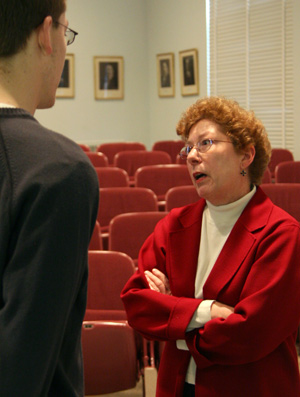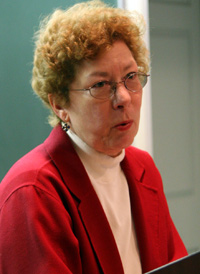Terrorism as a field of study is arguably the most important area of foreign policy study in the 21st Century. As the "War on Terror" has been the self identified defining factor in the Bush administration’s foreign policy over the past seven years, it naturally follows the study of terrorism is an essential component in the political education of a Wabash student. Unfortunately the study of terrorism has only recently become a central area of study in political science, so listening to expertise developed over time may prove to be difficult.
 Fortunately this was not the case for Wabash. Dr. Martha Crenshaw, who is the Senior Fellow at the Center for International Security and Cooperation and the Freeman Spohli Institute for International Studies at Stanford University, published her first article on the subject of terrorism back in 1974. Since then she has published multiple articles and books on the subject and has become a leading academic expert in that area of study. The N. Ryan Shaw II Fund along with the Political Science Department sponsored the 11:15 talk on Tuesday as Dr. Crenshaw spoke to a packed audience in Baxter 101.
Fortunately this was not the case for Wabash. Dr. Martha Crenshaw, who is the Senior Fellow at the Center for International Security and Cooperation and the Freeman Spohli Institute for International Studies at Stanford University, published her first article on the subject of terrorism back in 1974. Since then she has published multiple articles and books on the subject and has become a leading academic expert in that area of study. The N. Ryan Shaw II Fund along with the Political Science Department sponsored the 11:15 talk on Tuesday as Dr. Crenshaw spoke to a packed audience in Baxter 101.
Dr. Crenshaw noted since 9/11, the bush administration has released approximately eight strategy statements regarding terrorism. Although she did not have enough time to go into all eight, she choose to focus her talk on a series of statements coming out of the immediate aftermath of 9/11 and again in 2006 when the administration did an assessment of the war.
One of the most important decisions coming out of the statements after 9/11 was the conscious choice to use the verbiage ‘war on terror’.
"It did not have to be framed as a war," Crenshaw said. "The president chose to do so. There are divergent accounts as to why we came about calling it ‘war’ or simply something else. It could have been simply a ‘counterterrorism strategy’, not a ‘war on terrorism’. He could have said we could have gone to war against Al-Qaeda as we went to war against Afghanistan, but we choose to go to war against ‘terror and ‘terrorism’."
"People disagree exactly why he did this," she continued. "I talked to someone who was once on the National Security Council Staff and he said we didn’t mean a ‘war’, we just meant to be very important and we called it a ‘war’. Others have said Bush used it quite deliberately and that Bush used it as a mobilizing tactic and we really meant to use military force."
Because there was a choice of using the word ‘war’ to describe the terrorism conflict, Crenshaw noted that certain precepts were accepted. "If it was a war," she said, "it means you’d have to use military force, it’d mean there is an enemy out there and it’d mean there had to be victory at the end."
Based on this framework, Crenshaw said a ‘victory’ in the war on terror for the bush administration in 2002-2003 would mean a world in which terrorism does not define the everyday lives of Americans and their friends or threaten our way of life.
 By 2006 after multiple years in Iraq, Afghanistan and fighting terrorism the administration redefined what victory meant.
By 2006 after multiple years in Iraq, Afghanistan and fighting terrorism the administration redefined what victory meant.
"If you shift forward to the 2006 expression of this strategy," Crenshaw said, "there’s almost a complete change. By this time the new goal of American strategy is to bring effective democracy and end tyranny around the world. This is the American strategy for ending terrorism."
"This is an enormously ambitious objective," she continued, "and in doing so, and I’m quoting directly from the strategy, ‘to create an environment inhospitable to extremism.’ The assumption is by bringing democracy that would be an end to extremism around the world."
Crenshaw offered the audience some of her own conclusions on the ‘war on terror’ drawn on years of study of the subject.
"I think we need to drop the war metaphor," she said. "We should decouple counterterrorism strategy from ‘war’ and we should decouple Iraq from counter terror measures. I think we need to deemphasize the use of military force in dealing with terrorism. I don’t think it creates an atmosphere inhospitable to extremism and if you want to persuade people to reject these murderous ideologies you need to do more than coercion by force. You also need to recognize that this is not just coming from a group located in the northwest providence in Pakistan but really this is something that occurs in democracies not just against democracies."
Crenshaw also believes the Al-Qaeda threats to the existence of the United States were overblown.
"I think we also need to recognize Al-Qaeda does not threaten the existence of the United States," she said. "It never did, it never will and it’s not the equivalent of Nazi Germany or Japan during World War II or the Soviet Union during the cold war. We need to put the threat in proportion and undemocratic counterterrorism means will only undermine our credibility and authority to lead a coalition and persuade allies to pay the cost of counterterrorism."
The talk was followed by a question and answer period. On such a divisive subject, the audience’s reaction was mixed.
"Overall I thought it was a very good talk," said Brian Deyo ’08. "I was a little concerned by her notion that there was not an existential threat by any terrorist organization."
I thought it was a terrific talk," said Economics Professor Christie Byun. "She touched on a lot of interesting subjects that are relevant to foreign policy today. Her analysis was very insightful and very informative."
Photos by Clayton Craig '08